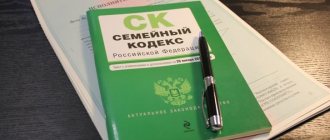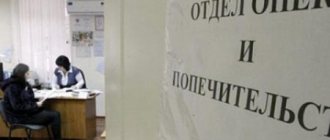Who opens an inheritance case and when?
Taking measures to protect the inheritance is impossible without opening an inheritance case.
The inheritance case is opened by a notary at the place of opening of the inheritance, who, according to Art. 1115 of the Civil Code, the last place of residence of the deceased is considered.
The establishment of an inheritance case is carried out to document all data on the transfer of rights to inherited property. The basis for its opening is the first document received by the notary from the potential recipient and indicating the opening of the inheritance:
- death certificate;
- a court decision recognizing the testator as deceased;
- application for the issuance of a certificate of inheritance, and so on.
All such documents can be delivered to the notary either in person or by post.
Measures to protect inheritance requiring management
The notary notifies the internal affairs bodies about the presence of items or substances prohibited for free circulation on the market in the property left by the deceased. Decisions are made on the possibility of issuing permission to the heir to use them, for example, such a document is a license to carry civilian weapons.
Measures to protect inheritance include drawing up a separate inventory of property for which special management is required. When compiling it, the performer is guided by the federal law “On Weapons”.
If a notary establishes that a weapon is an item of historical value, the basis for a measure to protect the inheritance - the production of an inventory - is the federal law “On the export and import of cultural property” and the federal law “On the Museum Fund of the Russian Federation and Museums in the Russian Federation”. This category also includes antiques, archaeological treasures, and paintings.
Author of the article
Acquisition of inherited property
From the perspective of legislation, in particular, Art. 1152 of the Civil Code, in order to acquire inherited property, the successor must unconditionally accept it. To do this, in accordance with Art. 1153 of the Civil Code, the heir can, by contacting a notary or by actually accepting the property, by performing the following actions:
- taking possession or management of property;
- taking measures to preserve property;
- payment of expenses for its maintenance;
- paying off the debts of the deceased or receiving funds due to him.
The article “Accepting an inheritance” will help you obtain more complete information about acquiring an inheritance.
Taking measures to protect inherited property
Measures to protect inherited property are taken by state notaries when this is necessary in the interests of heirs, legatees, creditors or the state (clause 95 of the Instructions). The basis for the commission of this
Notarial action is provided by messages from various institutions, organizations, enterprises, including police, house management, as well as individuals regarding the death of citizens, as a rule, those with whom the heirs do not live together. Sometimes protective measures can be taken in relation to the property of the deceased, some of whose heirs lived with him, and some separately, if there were disagreements and disputes between them regarding the inheritance. If the heirs of the deceased or some of them actually took possession of the inherited property and none of them If they do not make a request for protective measures, then there is no need to take such measures.
This notarial act is performed at the place of opening of the inheritance, which is determined in accordance with Art. 526 Civil Code. Since the place of opening of the inheritance does not always coincide with the location of the inherited property, measures to protect the latter can be taken by the notary at the place of opening of the inheritance directly or by instructing state notaries or officials of the executive committees of village, town, city councils at the location of the property (clause 95 of the Instructions) .
According to reports from citizens, enterprises, institutions, and organizations, such measures can be applied by state notaries at the location of the property with notification of this to the state notary at the place of opening of the inheritance. ,
Instructions from state notaries or officials of executive committees of village, town, city councils of people's deputies and messages from citizens, enterprises, institutions, organizations about the availability of property left after the deceased are registered in the Book of Registration of Applications for Taking Measures to Protect Inherited Property.
The state notary applies measures regarding the protection of inherited property no later than the next day from the date of receipt of a message or application about the existence of property requiring protection. Timely co-
The performance of this notarial act prevents the possibility of loss, damage, or theft of property belonging to the deceased person.
The measures under consideration can only be taken upon presentation of a death certificate or if there is reliable information about the death of the testator.
As part of measures to protect inherited property, a notary has the right to perform the following actions:
- notification of heirs;
— acceptance of claims from the testator’s creditors;
— inventory of inherited property;
— transfer of property for storage;
- appointment by the notary office of a custodian, and by the executive committee - a guardian over the inherited property, if it needs management, as well as in the event of a claim by the creditors of the testator before the acceptance of the inheritance by the heirs;
— an order for the issuance of certain sums of money from the inherited property.
A public notary who has received a message about the opening of an inheritance is obliged to notify about this those heirs whose place of residence or place of work he knows, as well as to call the heirs by means of a public announcement or reporting this in the press. However, the law does not impose on him the responsibility of searching for heirs.
The state notary at the place of opening of the inheritance accepts claims from the testator's creditors, which must be presented in writing and accepted regardless of the expiration of the right of claim. Creditors submit their claims within six months from the date of opening of the inheritance. Notary offices do not satisfy creditor claims. The state notary notifies the heirs who accepted the inheritance about the received claim. The heirs inform him whether they agree to repay the testator's debt or not. The notary notifies creditors of the results. If the heir refuses to repay the creditor's claim, the notary explains to the creditor the judicial procedure for collection.
To protect inherited property, the state notary makes an inventory of the inherited property with the participation of interested parties, if they so desire, in the presence of at least two witnesses (clause 99 of the Instructions). Witnesses (witnesses to the inventory, establishing the correspondence of the inventory act with the actual state of affairs) are invited by the notary at the location of the inherited property.
The inventory report must indicate:
— date of receipt of an order or application (notification) to take measures to protect the inherited property;
— date of the inventory;
- last name, first name and patronymic of the persons taking part in the inventory;
- last name, first name and patronymic of the testator;
— time of death of the testator and location of the described property;
— whether the premises were sealed before the arrival of the public notary and by whom;
— whether the seal or seal was broken; detailed characteristics (name, size, number,
year of manufacture, factory brand, color, grade, etc.) and the assessment of each of the items listed in the act and the percentage of wear.
The assessment of the described items is carried out (taking into account their wear and tear) by a state notary and persons taking part in the inventory of inherited property, and residential buildings - based on a restoration or insurance (in areas where an inventory has not been carried out) assessment.
In case of disagreement with the assessment, the heirs have the right to invite a specialist appraiser. Payment for the specialist's labor is made by the heirs.
On each page of the act, a total of the number of things (objects) and their value is summed up, and after the end of the inventory - the total total of the number of things (objects) and their value.
The inventory report includes all property located in the house (apartment) of the deceased. Statements from neighbors and other persons about
the belongings of individual things to them are entered into the inventory act, and interested parties are explained the procedure for filing a lawsuit in court to exclude this property from the inventory.
If the inventory is interrupted or continues for several days, the premises are sealed each time by a state notary. In the inventory act, a record is made of the reasons and time of suspension of the inventory and its resumption, as well as the conditions of seals and seals the next time the premises are unsealed.
At the end of the act, the surname, first name and patronymic, year of birth of the person to whom the property was transferred for storage, name of the document proving his identity, number, date of issue, name of the institution that issued the document, place of residence of this person are indicated.
The inventory report is drawn up in at least three copies. All copies are signed by a state notary, interested parties, witnesses and the person to whom the property has been transferred for storage. One copy of the act is issued to the person who accepted the inherited property for storage.
If it is impossible to take measures to protect the inherited property (heirs or other persons who lived with the testator object to the inventory, 1 property has been taken out, etc.), the state notary draws up an act and informs interested parties about it, and, if necessary, to the financial authority or prosecutor's office.
When seizing inherited property from the inventory act, a special inscription is made on the last sheet, in which, signed by the state notary, as well as other persons who signed the inventory act, a list of seized items is given. This inscription is sealed by a public notary.
The notary transfers the described seized property for storage to the heirs or other persons whom he appoints.
Exceptions to the general inventory and storage procedure are established for the following types of property:
- things that have no value;
— food products;
— cash and securities;
— documents of historical, cultural or scientific significance;
— explosives, ammunition and weapons;
— historical and cultural monuments.
If during the inventory of the inherited property there are things that, due to wear and tear, are of no value, the state notary, with the consent of the heirs or the financial authority (in the case when the inventory is made without the participation of the heirs), does not include these items in the inventory act, but according to a separate inventory transfers them for destruction or to a waste raw materials procurement base.
If food products are identified among the inherited property, the state notary transfers them to the heirs. If the inventory is made without the participation of heirs, long-term storage products are transferred to the relevant organizations for sale. The transfer is made according to a separate act, which is signed, in addition to the state notary and witnesses, by the heir or representative of the organization to which the products were transferred.
Sums of money or securities remaining after the deceased, at the request of the heirs or other interested parties, according to a separate inventory, are deposited no later than the next day after the inventory is taken into the deposit of a state notary office, where they remain until they are issued to the heirs or transferred to the relevant financial authority in cases of transfer of inherited property to the state by right of inheritance.
Silver and monetary metals (gold and metals of the iridium-platinum group in any form and condition, foreign currency and payment documents expressed in foreign currency or monetary metals, other securities, shares, bonds, coupons for them, bills (drafts), promissory notes , letters of credit, checks, bank orders, certificates of deposit, etc.), products made of silver and monetary metals, precious stones, as well as precious stones, pearls at the request of heirs or other interested
persons are handed over no later than the day following the inventory for storage to the appropriate banking institution.
Storage of inherited property on deposit at a state office or in a bank is carried out at the expense of the heirs or other interested parties (clause 101 of the Instructions).
The specified valuables accepted for storage by the notary's office using the above methods are registered in the Valuables Accounting Book.
At the request of heirs or other interested parties, the mentioned values may be transferred to them.
If valuable manuscripts, literary works, letters of historical or scientific significance are found as part of the described property, these documents, according to a separate inventory, are handed over for safekeeping to the heirs, other persons or relevant institutions (institute, museum, etc.). If it is impossible to transfer the above for safekeeping, the state notary will seal the documents or the storage room with the documents.
Explosives or means of explosion, ammunition, weapons, special means of self-defense, charged with tear and irritant substances (gas pistols, revolvers, cartridges for them) found in the property of the deceased are handed over to the internal affairs bodies according to a separate inventory.
When identifying objects in the hereditary property that are registered with the state as historical and cultural monuments, the state notary reports this to the relevant authorities for the protection of historical and cultural monuments.
~ЇІIf there is property in the inheritance that requires management (a residential building, an apartment, livestock, etc.), as well as in the event of a claim by the testator’s creditors before the heirs accept the inheritance, the state notary appoints a custodian of the property, about which a resolution is made signed by the state notary notary. The resolution indicates for what reasons the appointment of a custodian is necessary, and in the dispositive part - who is appointed
• custodian of inherited property, and also contains • a warning about responsibility for the safety of property.
The public notary warns the custodian and other persons to whom the inheritance is transferred for storage
• property, criminal liability under Art. 182 of the Criminal Code in the case of its embezzlement or concealment, as well as on financial liability for damage caused. Property liability - I responsibility of the custodian in accordance with Art. 419 of the Civil Code is determined as follows: a) for loss and shortage of property - in the amount of the value of this property; b) for damage
• property - in the amount by which its value has decreased. In this case, the custodian responds based on the assessment
property specified in the inventory report, since it has not been proven that the actual value of the lost, missing or damaged property is lower or higher than this amount. If the І result of damage to property for which the custodian from-| If its quality has changed so much that it cannot be used for its original purpose, the heirs have the right to refuse to receive this part of the property and recover its value.
A receipt is taken from the indicated persons regarding the warning, which can be set out in the act of inventory of the inherited property, according to which it is transferred for storage, or in the resolution on the appointment of a custodian of the inherited property. The receipt indicates the last name, first name and patronymic, passport details and address of the person who accepted the property for storage.
In the case when a non-heir is appointed as the custodian of the inherited property, the notary is obliged to obtain the consent of the latter, since in fact a storage agreement is being concluded in favor of a third party - the heir (Articles 160, 413 of the Civil Code).
In necessary cases, the state notary, before accepting the inheritance by one or all heirs, and if the inheritance passes to the state, then before issuing a certificate of the right to inheritance to the state, gives an order to issue sums of money from the inherited property to cover the
Costs:
1) to look after the testator during his illness, as well as for his funeral;
2) for the maintenance of persons who were supported by the testator;
3) to satisfy claims provided for by labor legislation and other claims equivalent to them;
4) for the protection of inherited property and its management, as well as costs associated with notifying the heirs about the opening of the inheritance.
At the request of a public organization at the place of last work or residence of the testator, relatives or other persons close to the deceased who has no heirs, for the installation of a tombstone for him, the state notary, in the case of a monetary deposit in the name of the deceased, gives an order to the banking institution to transfer to the enterprise or organization establishing tombstone, its value. In exceptional cases, such an order may be issued in the name of a person who has provided the relevant documents to the notary’s office, including the invoice of the company manufacturing and installing the tombstone, indicating that this person has paid the cost of the tombstone.
If there are no monetary amounts in the inherited property, the state notary has the right to give an order to issue from the inherited property things, the cost of which should not exceed the amount of actual expenses incurred for the needs indicated above.
Expenses to be paid from the estate are reimbursed by the notary if they are documented. In the absence of such confirmation, the notary explains the judicial procedure for reimbursement of costs. As evidence of the above-mentioned expenses, the state notary can accept a store invoice, a certificate from a medical institution, a funeral commission, a court decision, etc. Order on the issuance of money from the inherited property for the funeral of the testator to the state
a deed of gift can be made by a notary before the funeral of the testator on the basis of the death certificate of the testator and the application of the interested person. After the funeral of the testator, such an order is issued by a public notary after the interested party presents the relevant documents.
One copy of the order of the state notary on the issuance of sums of money or things from the estate to cover certain expenses remains in the files of the state notary's office and is filed in the estate file.
Protection of the inherited property lasts until all heirs accept the inheritance, and if it is not accepted, until the end of the period established by civil law for accepting the inheritance, i.e. as a general rule, six months (Article 549 of the Civil Code^
Protection of inherited property can continue after the expiration of six months from the date of opening of the inheritance if the state notary office receives an application for consent to accept the inheritance from persons for whom the right of inheritance arises in the event of non-acceptance of the inheritance by other heirs (Part 3 of Article 549 of the Civil Code) and if there are less than three months left before the expiration of the six-month period established by law for accepting the inheritance. In this case, the protection of the inherited property continues until the acceptance of the inheritance by all heirs, and when it is not accepted by them, until the expiration of three months from the date of receipt from any of these persons of an application for consent to accept the inheritance, if the part of the six-month period that remains to accept an inheritance is less than three months
| If the protection of property is terminated due to the acceptance of the inheritance by the heirs, the notary checks the basis of the inheritance from the documents and explains to them the right to receive a certificate of the right to inheritance.
Measures to protect inherited property are terminated by a state notary or an official of the executive committee of the Council of People's Deputies who took them. If the place of opening of the inheritance and the month of taking measures to protect it are different, the state is notified in advance of the termination of protection of the inherited property.
new notary at the place of opening of the inheritance.
In accordance with clause 45 of the Instruction on the termination of protection of inherited property, the state notary at the place of opening of the inheritance notifies the heirs in advance, and in the case of transfer of property by right of inheritance to the state, the relevant financial authorities.
Persons who protect inheritance
According to Part 1 of Art. 1171 of the Civil Code, the responsibilities for taking measures to protect inherited property are assigned to:
- to the executor of the will, appointed by the testator in accordance with Art. 1134 GK;
- to the notary in charge of the inheritance matter;
- to an official performing notarial acts according to the law.
The first does this on his own initiative or at the request of legal successors, while the second does this at the request of heirs, guardianship authorities, local government and other persons specified in the law.
Each of these persons is guided by the law and takes measures established by the Civil Code within the framework of their own powers.
According to Part 5 of Art. 1171 of the Civil Code, the protection and defense of the inheritance rights of successors is carried out by the notary who opened the case, even if the property to be inherited is located in different places.
Protection of inheritance by a notary
As already mentioned, inheritance rights may be under notarial protection, which, according to Part 6 of Part. 1171 of the Civil Code, is regulated by the Fundamentals of Legislation on Notaries.
According to Art. 64 Fundamentals, the protection of inherited property can be carried out by a notary not only upon notification of citizens or legal entities, but also on his own initiative, if the interests of heirs, creditors, the state and other persons require it.
The task of the notary in this case is to ensure the protection of the inherited property and its preservation in proper form, excluding its damage, loss or theft.
Measures to protect property that does not require management
The measures that a notary is authorized to take to ensure the safety of inherited property are determined by Art. 1172 Civil Code. In particular, it provides the opportunity to:
- conducting an inventory of the property of the deceased, which may be attended by legal successors, the executor and, in certain cases, guardianship authorities;
- valuation of the described property, carried out with or without the consent of the successors;
- depository and banking storage of money and jewelry. The testator's cash is transferred for safekeeping to a notary's deposit, and currency, precious metals and stones are transferred to a banking institution;
- transferring weapons recognized as inherited property for storage to internal affairs bodies;
- transfer of other property that does not require management for storage to heirs or other persons, at the discretion of the notary.
Measures to protect property requiring management
If in the inherited property a notary discovers property that requires not only protection, but also management, he, by virtue of Art. 1173 of the Civil Code, appoints a manager with whom he enters into an agreement for trust management of inherited property. This design allows the notary to protect the interests of the heirs even without their participation.
The right of claim granted to a notary gives him the opportunity to control not only the order of proper management, but also to demand compensation for losses, lost profits, penalties and other compensation, the right to which arises as a result of improper management.
Inventory of inheritance
By virtue of the requirements of Art. 66 Fundamentals of legislation on notaries, the first thing a notary does to ensure the safety of inherited property is to make an inventory of it.
According to Art. 1172 of the Civil Code, to protect the inheritance, the notary must make an inventory in the presence of 2 witnesses, including, in accordance with Part 2 of Art. 1124 Civil Code, cannot include:
- the notary himself;
- heirs, their close relatives and family members;
- persons with limited legal capacity;
- illiterate;
- persons whose physical disabilities prevent them from understanding what is happening, and so on.
According to clause 26 of the Methodological Recommendations for performing certain types of notarial actions, approved by Order of the Ministry of Justice dated March 15, 2000 No. 91, the inventory act displays all the property of the deceased, including personal belongings. pp. 6 paragraph 26 of the Methodological Recommendations requires a description of the detailed characteristics of each of the items included in the inheritance.
In addition, this paragraph regulates other mandatory details of the inventory act, as well as the procedure for its implementation and execution. The act is drawn up in at least 3 copies, signed by a notary, interested parties and witnesses.
Storage of inheritance by specialized institutions
According to Part 2 of Art. 1172 of the Civil Code, all jewelry, currency and securities discovered as part of the inventory of the inheritance are subject to transfer for safekeeping to the bank. At the same time Art. 66 Fundamentals of legislation on notaries allows any valuable property of the deceased, if it does not require management, to be deposited with a notary or even transferred for safekeeping to heirs and other persons.
Therefore, due to the existence of an explanatory norm, jewelry does not necessarily have to be transferred for storage to a specialized institution. In contrast to weapons, ammunition and explosives, which, according to paragraph 26 of the Methodological Recommendations, are not only necessarily transferred to the internal affairs bodies for storage, but also require a separate inventory.
In addition, the notary must notify the relevant government authorities about the identification of objects of art during the inventory that may constitute historical, artistic or cultural value.
The transfer of any property included in the inheritance for storage in a specialized organization is formalized by a custody agreement.
The person to whom the property is transferred for storage must be warned of responsibility for its waste and damage.
Trustee of an inheritance: conditions and responsibilities
According to Art. 1173 of the Civil Code, if the inheritance includes property that requires not only preservation, but also management, the notary or executor of the will, who enters into an agreement with the trustee, transfers it to trust management.
The trustee, in accordance with Art. 1015 of the Civil Code, can be an individual entrepreneur, any commercial or non-profit organization, except for unitary companies and institutions, as well as any citizen who is not an individual entrepreneur.
Since the law prohibits the manager from being a beneficiary, none of the heirs can act as a beneficiary.
By virtue of Art. 1020 of the Civil Code and within the framework of the terms of the trust management agreement, the manager exercises the powers of the owner in relation to the property that is transferred to him. However, this does not give him any rights to the property entrusted to him.
In this case, the agreement may establish the form and procedure for the manager’s reporting to the notary, executor or heirs in relation to his activities.
According to Art. 1023 of the Civil Code, the appointed manager is responsible for:
- for losses caused by his fault;
- for failure to take due care of the interests of the heirs, the notary or the executor of the will;
- for exceeding the powers entrusted to him by the contract and the formation of obligations under transactions that arose as a result.
The manager is obliged to compensate for losses caused by loss or damage to the entrusted property, possible lost profits, as well as independently fulfill obligations arising from abuse of authority.
If required by the trust agreement, the trustee must provide collateral to secure compensation for losses.
Special procedure for storing inherited property
In addition to the usual regime for storing inherited property, the legislation also provides for a special procedure. It applies if the inheritance includes currency values, securities, precious stones and metals. According to established standards, these valuables must be stored in a banking organization. Such an organization is chosen by the notary to whom the property of the deceased testator has been transferred for safekeeping.
The transfer of valuables is carried out in accordance with the agreement. It must necessarily contain information about the inherited property, including a complete list of precious stones, banknote numbers, etc.
After the valuables have been transferred to the bank for trust storage, the notary receives a personal safe document, on the basis of which, in the future, it will be possible to return all valuables that are hereditary property.
The rights and obligations of persons responsible for trust storage are determined by the concluded agreement.
The agreement must also indicate a clear time period during which the assets that are hereditary property will be stored in the bank branch. Costs associated with the storage of material assets fall on interested parties - the heirs of the deceased testator.
Author of the article
Subjects of protective actions in relation to inheritance
The exercise and protection of inheritance rights are two completely different procedures that inheritance includes. If the possibility of the first lies exclusively with the heirs, then protective actions, according to Art. 1171 of the Civil Code is the prerogative of other entities, although participation in the protection of the inheritance of the successors themselves cannot be ruled out.
By virtue of the law, they can be anyone who in one way or another carries out protective actions in relation to inherited property or entrusts their implementation.
These entities may be:
- notary;
- executor of the will (executor);
- legal representatives of successors;
- guardianship and trusteeship authorities;
- persons protecting the inheritance on the basis of an agreement: banks and other custodians of property, trustees, and so on.
Their powers regarding the protection of entrusted property are regulated by an agreement under which they bear civil and sometimes criminal liability.
Remuneration for protection of inheritance
According to Art. 67 of the Fundamentals of Legislation on Notaries, subjects of security actions carrying out the storage of inherited property, if they are not successors, have the right to demand remuneration from the heirs for their services. Its size is determined by the storage agreement and other agreements.
According to Decree of the Government of the Russian Federation dated May 27, 2002 No. 350, the maximum amount of such a fee cannot be more than 3% of the value of the inherited property determined as a result of the assessment.
In addition to the fee, the subjects of security actions may demand reimbursement of expenses incurred as a result of the storage and management of property, minus the benefits received from it.
The amount of the notary's remuneration is determined differently. So, according to clause 8, part 1, art. 22.1 of the Fundamentals of Legislation on Notaries, the notary fee for accepting the deceased’s funds or securities for deposit is 0.5% of the accepted amount or the market value of the securities, but not less than 1 thousand rubles.
Amount of state duty for inheritance protection
For security measures taken by the notary, a state fee is charged, the amount of which, according to clause 23 of Part. 1 tbsp. 333.24 Tax Code, is 600 rubles.
If there are several successors, the duty, in accordance with the provisions of Art. 333.25 Tax Code, paid by each of them.
You can learn more about the procedure for paying the duty from the article “State duty on inheritance in 2021.”
Who can contact a notary
As a rule, if the heirs (one of them) lived together with the deceased and inherit the residential premises, its protection is not required. However, the inheritance may include movable items: expensive collections, cars, cash. The risk of their loss is quite high, so one of the relatives most often requests the protection of inherited property.
In addition to legal successors, the guardianship and trusteeship authorities, the executor of the will (executor), representatives of the administration, and other interested parties (creditors, legatees) have the right to submit an application to the notary's office. They usually take part in inheritance cases when the successors include minor children, incapacitated or partially capable persons.
Moscow notary Kolganov I.V. comments:
Representatives of government authorities are interested when inherited property may become escheated - that is, there are no heirs by law or by will. In addition, protection of inheritance is required if it includes an enterprise or a share in an LLC. In this case, the property requires management in order to ensure safety and prevent a decrease in its value.
Duration of protection and management of inheritance
Protection of inherited property, according to Art. 1171 of the Civil Code, is limited to the period during which the heirs must receive the inheritance. The general rule defined by Art. 1154 of the Civil Code, gives six months for this.
In exceptional cases, when the right of inheritance arises due to the refusal of other heirs or their recognition as unworthy, or transmission and in other cases, 9 months are allotted for this.
Measures to protect the inherited property are taken by the notary during this entire time.
The powers of the executor in this matter are not limited by time limits - he is responsible for protecting the inheritance until the will is executed.
Maximum terms are important when drawing up contracts for storage and property management.
The presence of deadlines for protection does not at all require its implementation throughout the entire period: according to Part 2 of Art. 1171 of the Civil Code, the protection of inherited property begins with the notary receiving a corresponding application from one or more interested parties.
All measures taken can only be valid for the period remaining before the expiration of the period for entering into inheritance.
According to Art. 68 of the Fundamentals of Legislation on Notaries, the notary notifies interested parties in advance of the expiration of the protective measures.
Protection of inherited property continues until the expiration of the period established by law or until the successors actually enter into the inheritance.
Reimbursement of expenses for the protection and management of inheritance
It is no secret that all necessary procedures aimed at ensuring the protection and management of property entail certain monetary expenses. A sample list of major expenses includes the following:
- cash expenses spent on paying for services for storing property included in the inheritance mass;
- costs of notifying heirs of the fact of opening an inheritance - publication in a newspaper, etc.;
- expenses for transportation services, in cases where inherited property (paternal or maternal) needed to be delivered to a specific address;
- reimbursement of various expenses for the required legal procedures if trust management of inherited property took place;
- payment for state registration for the transfer of this or that property into trust management of authorized persons;
- other costs that were spent on the protection of property or on the trust management of inherited property.
According to the inheritance law of the Russian Federation, payment of all of the above expenses becomes the responsibility of persons interested in receiving inherited property. Thus, after the death of the testator, these obligations for financial compensation pass to his heirs.
Issuance of a certificate of inheritance
Certificate of inheritance, according to Art. 1162 of the Civil Code, issued by the notary conducting the inheritance case. This document confirms the rights of the successors and gives them the right to fully dispose of the inherited property. This certificate is issued based on the application of the successor.
More information about obtaining it can be found in the article “Certificate of Inheritance”.
Features of inheritance by minors
Due to the impossibility of independent protection of rights and interests, legislation requires a special approach to the inheritance procedure with the participation of minors.
If citizens under 18 years of age are included in the circle of successors, and the inheritance procedure requires a contractual or judicial division of the inheritance, according to Art. 1167 of the Civil Code, the protection of the rights of minor heirs involves the involvement of legal representatives and guardianship authorities.
If the minor is the child of the deceased, Art. 1149 of the Civil Code guarantees him an obligatory share in the inheritance equal to 50% of their legal share, even if the will assigns all the property to other persons.
You can learn more about this from the publication “Inheritance by Minors.”
Trust management of inheritance objects
If the inheritance includes:
- joint-stock company;
- company;
- firm;
- share in business;
- block of shares;
- rights to the results of intellectual activity, etc., a trust management agreement is concluded by a notary or executor (Article 1173 of the Civil Code of the Russian Federation). Indeed, in the absence of such management, irreparable harm may be caused to the heirs: capital is withdrawn from the country, businesses and securities are sold for a nominal fee, an agreement is concluded on the free use of intellectual property, etc., which ultimately leads to a decrease in the value of the inherited property. property.
The trustee can be an individual entrepreneur, a commercial organization, an individual or any foundation (Clause 1 of Article 1015 of the Civil Code of the Russian Federation). The following cannot manage inherited property:
- unitary enterprises - they do not have their own property to pay off losses as a result of illegal actions in the process of trust management;
- institutions;
- heirs of all lines as possible beneficiaries.
You cannot enter into management agreements during the life of the testator, since the situation may change and the future manager will become a beneficiary. However, the will can specify who the executor can appoint as administrator.
Trust management agreement
An agreement for trust management of inherited property has the same status as an agreement for the sale and purchase of real estate. Therefore, it must be formalized in writing (Article 1017 of the Civil Code of the Russian Federation), and then registered with Rosreestr in the same manner, with the payment of the appropriate fees, as newly acquired real estate.
Failure to comply with the rules for drawing up a contract leads to its recognition as void (invalid). Judicial practice shows that the slightest errors lead to the cancellation of contractual obligations. Therefore, it is very important to stipulate in the text of the contract:
- a list of property over which management is established;
- full name of the organization or individual who requested the conclusion of such an agreement;
- full details (full name, residential address and passport number and series) of the manager;
- a complete list of possible beneficiaries (so that it does not turn out to be the manager);
- the amount of remuneration for the manager and the form of payment (monthly or after accepting the inheritance, in one payment);
- contract time.
The agreement is signed by the notary (executor) and the manager.
Property management terms
The terms of trust management of the testator's property, if such a procedure is not specified in the will, are established by the notary who opened the inheritance case. In doing so, he must be guided by:
- Art. 1154 of the Civil Code of the Russian Federation, which indicates the generally accepted management period - 6 months;
- p.p. 2 and 3, art. 1154 and paragraph 2, art. 1156 of the Civil Code of the Russian Federation, allowing the contract to be extended up to 9 months when extending the period of entry into inheritance.
Attention: after 09/01/2018, in the interests of minors, a trust management agreement can be concluded for a period of up to 5 years (Article 1171 of the Civil Code of the Russian Federation as amended on 07/29/2017).
Disabled dependents of the deceased
The law also protects the rights of disabled dependents of the deceased. In addition to the Art. 1149 of the Civil Code of the obligatory share in the inheritance, according to Art. 1148 of the Civil Code, they can be called to inherit on an equal basis with other heirs called in order.
If they are among the legal heirs, but are not called to inherit, or are not among the legal successors, but lived with the deceased during the last year of life, they must receive the part of the inheritance in the order in which they are called to inherit.










